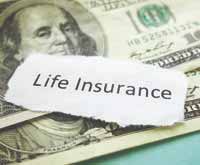ACCELERATED DEATH BENEFITS RIDERS (ADB)
What is an accelerated death benefit rider?
An accelerated death benefit rider is an option added to a life insurance policy contract that enables the policy owner to apply for an advance on the death benefit proceeds during the lifetime of the insured.
When can an accelerated death benefit payment be requested?
The insured must have a limited life expectancy or meet certain medical circumstances to be eligible for an advanced payment of all or a portion of a life insurance policy's death benefit, including
- Terminal illness, with death expected within 24 months.
- Serious illness, such as cancer, which would result in a drastically reduced life expectancy without extensive treatment.
- Catastrophic illness requiring extraordinary treatment, such as an organ transplant.
- Long-term care needed due to the inability to perform a number of daily living activities, such as bathing, dressing, or eating.
- Being admitted to hospice or permanent confinement in a nursing home.
How do you check if your life insurance policy has an accelerated death benefit rider?
First, review a copy of your policy and find the accelerated death benefits section. If the policy doesn't discuss the accelerated death benefit rider then check with the customer service department at your life insurance company to see if you can add it as a rider. If you receive group life insurance, check your group policy contract or with your employer's human resources department or union representative. If you need personal assistance, please feel free to contact Welcome Funds for a Free Personal Consultation.
How will an accelerated death benefit payment affect the policy's beneficiaries?
The death benefit will be reduced by the amount you received as an accelerated death benefit. If your policy's proceeds have been paid out entirely, then no benefit will be paid to your beneficiary(s) after your death. Always check with your life insurance company to verify how an accelerated benefit will affect your beneficiaries before you complete the claims process.
How much does it cost to have or add an accelerated death benefit rider?
The cost would be included in your policy's premium or added to the premium, usually as a percentage of the base premium. Some policies may include the rider at no cost and charge a fee only if a claim is made.
Will the life insurance company cancel the policy if they find out that the insured is in poor health?
No, your life insurance policy cannot be canceled as long as the premiums are paid as required. It would be a violation of insurance regulations if your policy was canceled for any other reason than non-payment of premium or fraud.
How much can the death benefit be collected through an accelerated death benefit rider?
Accelerated death benefit payments can range from 25 to 100 percent of the death benefit. The payment depends on your policy's face value, the terms of your contract, and the state you live in. The amount of your accelerated payment will be reduced by any outstanding loans against your policy. Additionally, there may be a small service fee charged by the life insurance company for the advanced payment. Ask your life insurance company for a quote before you exercise your accelerated death benefit claim. In addition to adjustments made by the life insurance company, some states may limit the percentage and amount that can be accelerated. Check with your state insurance department to determine limitations or contact your life insurance company's customer service department.
How are accelerated death benefits paid?
Each life insurance contract or rider specifies the method of payment or options. Payments may be made monthly or in a lump sum. Some life insurance policies will allow the policyholder to choose the method of payment.
Are accelerated death benefit payments taxable?
In most cases, accelerated death benefits are not subject to federal income taxes. Under the Health Insurance Portability and Accountability Act of 1996, the payment of an accelerated death benefit to a terminally ill individual (defined as having a prognosis of 24 months or less from a board certified physician) is treated as if it were a payment of the policy's death benefit, which is considered tax-free income at the federal level. A chronically ill person is usually exempt but may have to qualify for the exemption by being certified each year. To ensure compliance with current tax laws, check with a tax advisor.
Are there better ways to pay for health care and living expenses due to illness?
Accelerated death benefits are not intended to be a solution or replacement for health insurance or long-term care insurance. Accelerated death benefits should only be considered as a final option if all other reasonable alternatives have been exhausted.
Will collecting accelerated death benefits affect eligibility for Medicaid?
Under U.S. Department of Health and Human Services policy, you cannot be forced to collect accelerated death benefits from your life insurance policy before qualifying for Medicaid. But if you choose to receive accelerated death benefits, that money could be considered income, which might affect your Medicaid eligibility.
However, states are now recognizing the secondary market value of life insurance policies and are passing legislation that requires policy owners to sell a life insurance policy to the viatical settlement market if the policy has a face value above $20,000. The state of Texas was the first to pass such legislation in June 2013 and 8 additional states have similar legislation pending. The purpose of such laws is to lower the financial burden on the state's Medicaid Fund by requiring Medicaid applicants to "spend down" all of their assets before being accepted into Medicaid.
If the insured's health improves, does the accelerated death benefit payment have to be paid back?
Once the life insurance company approves an accelerated death benefit claim and makes the payment, you don't have to return the money if the insured's health improves. However, filing a false claim is considered fraud in many states and is subject to criminal or civil penalties.
If the policy owner is not the insured, who is eligible for the accelerated death benefit?
When the policy owner is not the insured, it is the insured that must be terminally or chronically ill for eligibility purposes. However, the policy owner can claim and receive the accelerated death benefits on the insured's behalf.
What if the life insurance company denies your claim for an accelerated benefit?
If the life insurance company has denied your claim for an accelerated death benefit, then they may have determined that the insured does not qualify based on their eligibility requirements. If this is your situation, there may be other options available to you. Taking a loan against the policy's cash value may be an option or a viatical settlement could be another alternative.
A viatical settlement is a financial alternative to an accelerated benefit that allows a policy owner to sell their life insurance policy to a state-licensed financial institution in exchange for the ownership and beneficiary rights to the policy. The financial institution then must continue to pay premiums to the life insurance company and will eventually receive the death benefit when the insured dies. Your beneficiaries will not receive any benefits under a viatical settlement unless it is specifically negotiated as a term of the viatical settlement agreement. Click here for more information on viatical settlements.
How do accelerated death benefits compare to viatical settlements?
An accelerated benefit is paid to the policy owner directly by your life insurance company and, if only a portion of your death benefit is accelerated, there may be some benefit remaining for your beneficiary. With a viatical settlement, a viatical settlement company buys your life insurance policy and pays you a percentage of the death benefit upfront in exchange for the ownership and beneficiary rights to the policy. The viatical settlement company becomes the owner and beneficiary of the policy, pays all the remaining premiums, and receives the full benefit when you die.
Like accelerated death benefits, viatical settlements for the terminally or chronically ill are generally tax-free if the same requirements are met. Click here to determine your eligibility for a viatical settlement.
How can Welcome Funds help?
Welcome Funds can assist you in determining if your life insurance policy provides an accelerated death benefit option by reviewing a copy of your life insurance policy and/or by confirming it with your life insurance company. Our staff works directly with most life insurance companies to verify policy values and coverage. If you do not have an accelerated death benefit rider, we may be able to assist you with the viatical settlement alternative. There is no cost or obligation to determine your eligibility, and we offer a free personal and confidential consultation.
Feel free to call us toll-free at 877.227.4484 or complete our Quick Life Settlement Qualifier to find out if your policy is eligible for a viatical settlement.

 877.227.4484
877.227.4484














